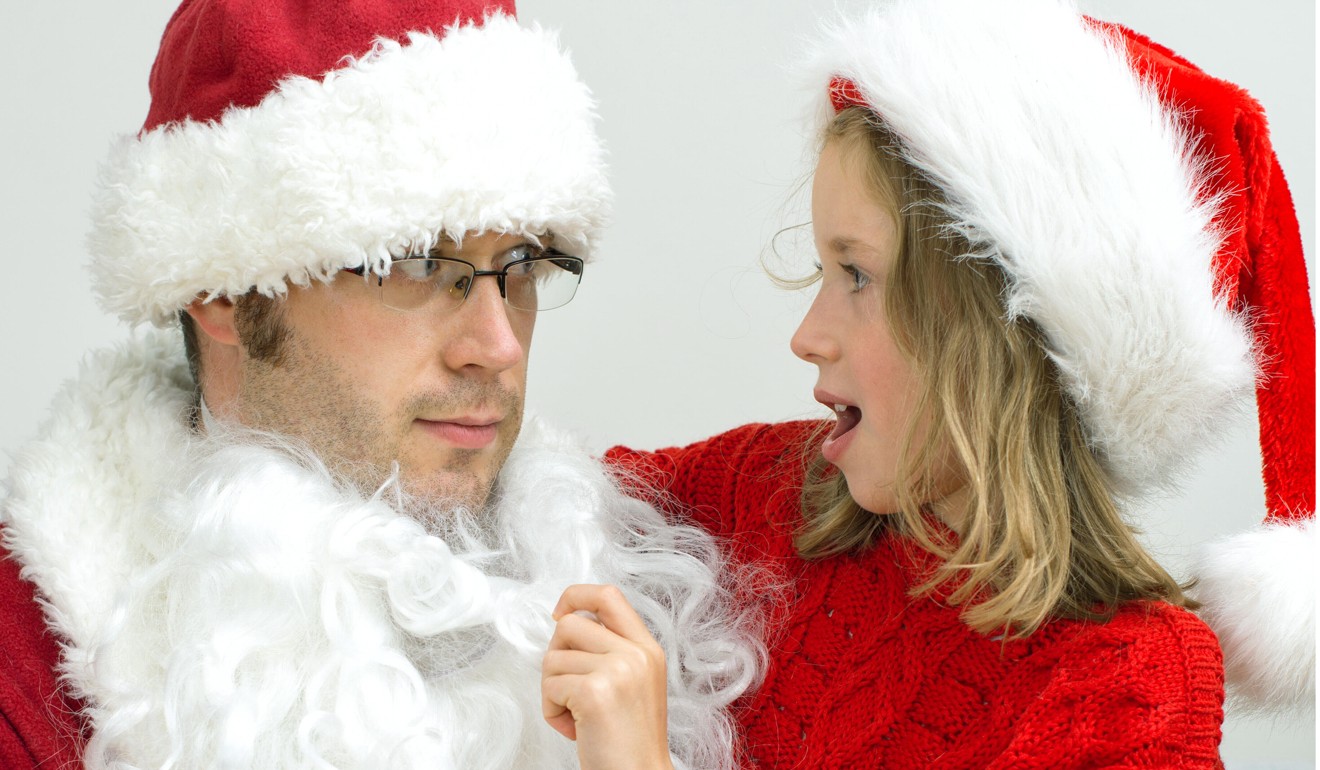
Father Christmas: should you tell your children the truth or encourage them to believe in Santa Claus?
Opinions are divided about whether perpetuating the Santa Claus story brings joy to their children or whether it encourages them to lie and crushes their trust in their parents’ honesty. We talk to psychologists and parents

Do you encourage your children to believe in Father Christmas? Do you promote the elaborate myth of a man with a full white beard and red hat, a string of reindeer and a sledge of presents?
Do you, as I did, leave out a nip of whiskey for him, a mince pie, a carrot and dish of water for his reindeer? I did: I tipped back the booze, ate the mince pie, leaving satisfyingly incriminating crumbs on the plate and scattered carrot tops as evidence of grazing.
Other parents go even further to prove Santa is real: leaving lanterns as landing lights on the lawn, then track to and fro, late at night, heavy booted to attest to midnight, gift bearing visitors.

But some parents don’t do any of that. One online poll suggests that 64 per cent of parents believe the rest of us are perpetuating a lie, undermining the true meaning of Christmas. They don’t do the Easter bunny or the Tooth Fairy, either.
Some parents resist the whole Santa thing because peddling make believe will – at best – when they find out the truth, crush them and, at worst, encourage them to lie.
“When parents lie to their children it only endorses lying,” says one mother. “Children are products of their environment and at a very young age they are easily influenced and believe what their parents tell them. As they grow older and begin to find out the ‘truth’ of things, the disappointment and feeling of being deceived can also make them question a parent’s reliability.”

Katrina Rozga, a psychologist at Hong Kong’s Jadis Blurton Family Development Centre, explains why some parents are adamant that the Santa myth is harmful.
“They believe such a long and large lie can damage a child’s relationship with – and trust in – their parents once they learn it had never been true,” Rozga says.
But, she warns, there are other reasons believing in Santa might cause issues: when children, for example, learn that Santa isn’t real in traumatic ways, such as in front of a whole class. If they are religious, the revelation may lead them to question religion.
They may think: “If I didn’t get what I wanted because Santa isn’t real, then maybe my prayers aren’t coming true because God isn’t real,” she says.
One mother, Catherine, remembers that when her daughter Daisy found out that Father Christmas wasn’t real. “She was furious with us and we had to try to convince her it was all just a lovely tradition of childhood, part of the magic of being a child. She has forgiven us now and is happy to get her stocking.”

Another mother, Christina, says their children sustained the myth for a long time until they discovered Father Christmas was all in their – or their parents’ – head: “I was afraid of spoiling their fun,” she recalls, laughing. “They clearly loved the whole secrecy of it. Maybe as much as, or more than, me.”
Rozga says some parents are resistant to the practice because promoting a belief in Santa’s existence “encourages good behaviour for the sake of presents”. As one parent warns: “If a parent wants to give his child a gift, which he normally has to work hard for or make sacrifices to obtain, why would he want all the credit to go to a superficial, imaginary being?”
[Some] believe such a long and large lie can damage a child’s relationship with – and trust in – their parents once they learn it had never been true
We may also be sending out mixed messages: don’t talk to strangers, don’t accept sweets from people you don’t know. But that old man you never see who delivers sacks full of gifts once a year – he’s fine.
But Father Christmas’ origins are innocuous. St Nicholas was a bishop who hailed from Turkey in the 4th century. A wealthy and benevolent man, he had a reputation for bestowing secret gifts upon the needy. He has evolved with the tradition and bears different names and slightly different habits depending on where in the world he appears. In Germany, St Nick leaves gifts in a bed-end boot on December 6. In Holland, Sinterklaas is aided by his naughty helper, Zwarte Piet (Black Pete – increasingly controversial in this day and age) on December 5.

Parents who continue to promote the story of Santa Claus do so because they see the imaginative value in it, Rozga says.
“Many also have many of their own positive memories of Christmas when Santa was still real, and their memory of figuring out Santa isn’t real centres around pride in solving this mystery. They see no harm in lying to their children because by the time children learn the truth they are able to distinguish between a ‘good lie’ and a ‘bad lie’, and will not feel anger towards their parents,” she says.
One father insists, indignantly, that it isn’t about “lying” at all. “What about Superman? Batman? Are comic books a lie? Creators of TV shows … are they lying? No. They’re trying to encourage fantasy and imagination.”
What about Superman? Batman? Are comic books a lie? Creators of TV shows … are they lying? No. They’re trying to encourage fantasy and imagination
Another observes: “Santa encourages generosity because he doesn’t take things for himself. He makes kids happy, excited, when they go to bed on Christmas Eve. It never hurts to teach children to believe in something they cannot see. Nor does it hurt to perpetuate the story of a good man – St Nicholas – who we personify in Father Christmas. It’s all about the narrative, really.”
Shelly Mok, counselling psychologist at Hong Kong’s Inner Light Psychological Practice, says it depends on how parents package the Santa story and how they manage the disappointment when their children find out the truth. Children can distinguish between reality and fantasy early in childhood and this ability grows with age.
In the end, Rozga says, both sides have good arguments, so it’s not easy to say whether a parent should choose to bring Santa Claus into their home during the Christmas season or not.
“Parents should research both sides to make an informed decision, just like they would with anything else, and use Santa as a critical thinking exercise [about] whether he exists in their home or not,” she says.